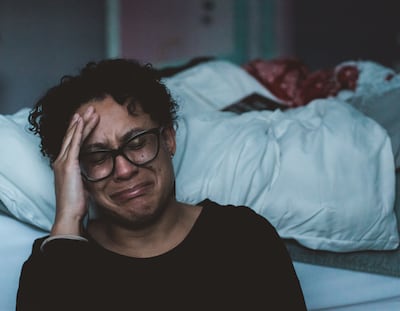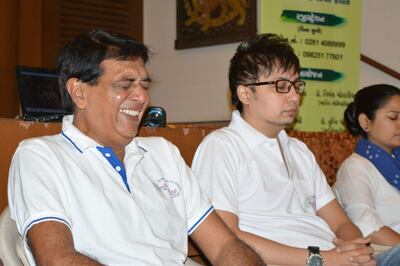Ruma Mehra, 38, was devastated after the death of her twin brother from Covid-19 last May. She grieved her sibling’s death, but gradually found herself withdrawing into a cocoon, unable to shed tears over the tragedy.
Her worried family consulted a psychiatrist who put Mehra on a two-week “emotion-focused therapy” course. EFT is based on the premise that emotions are key to identity, and required the mother-of-two to share her feelings as much as she could with her family or write them down.
“In the beginning, it was an effort. But when I saw my family affected by my state, I forced myself to express myself and share with them how sad I was feeling, reminiscing about good times with my brother and crying whenever I couldn’t hold back the tears,” says Mehra. After a month, she started feeling “lighter, brighter and ready to reclaim my life”.

As challenging as it may be, psychologists advise that the best way to handle sadness and grief is to embrace them. If talking about your circumstances helps, find empathetic people who will listen to you. If you feel like crying, go right ahead.
“Many people associate crying during grief with depression, when it can actually be a sign of healing,” says clinical psychologist Sakshi Gupta. "While women find it relatively easier to express themselves through tears, boys and men are socially conditioned not to, even though this can reduce negative health behaviours and help them have fuller lives."
Crying, she says, is a valuable “safety valve” and can bring mental health benefits. Doing so in a social setting can facilitate bonding and promote feelings of kinship or sorority. Withholding tears, on the other hand, can trigger stress, and lead to anxiety build-up, blood pressure and muscle tightening.
Biologically, crying releases cortisol and creates feel-good endorphins, which are also known as the body’s natural painkillers. Emotional tears also have higher levels of stress hormones in them, according to the American Academy of Ophthalmology. In other words, one is literally purged of distress as one cries.
Grief counsellor Mini Makhija says she advises her patients to “never hold back from crying” whenever they feel overwhelmed. “They come back reporting more mental peace followed by a gradual return to normalcy after they’ve purged themselves through bouts of crying,” she says.
Laughter therapist Kamlesh Masalawala was so convinced of the healing power of tears that he launched India’s first crying club in 2017 in Surat. One Sunday a month, men and women flock to the Healthy Crying Club for a collective and cathartic sobfest. “When laughter can be shared, why not grief?” says Masalawala.
When sorrow, misery and pain overwhelm you, “tears emerge naturally as a response stimulated by anxiety. When you experience pain deeply, you’re also able to feel happiness with the same intensity, leading to a fuller life,” he explains.

The club’s 100-odd members say the congregation provides them with a valuable outlet for their grief because, for many adults, crying at home isn’t an option for fear of hurting their loved ones. This often leads to an unhealthy build-up of negative feelings, triggering further stress and anxiety.
“I was very disturbed after my husband’s death last May,” shares one crying club member, 63, who requested anonymity. "As both my children are in Australia, and couldn’t even attend his funeral due to travel restrictions, there was a lot of pent-up hurt and sadness, which was impacting my health.
“When I come to the club and see others experiencing grief, I feel I’m not alone. It’s strangely comforting and I judge myself less harshly.”
The concept of holding a group activity to induce tears originated in Japan in 2013. Termed rui-katsu, the first crying festival was organised in Tokyo in 2017. Now, increasingly, the Japanese are booking themselves for community weeping sessions, with rui-katsu finding resonance among the young and old alike. A series of books that features pictures of men sobbing have also become popular.
A sales executive from Tokyo, 30, who requested anonymity, is a regular at rui-katsu sessions, which she finds therapeutic. “Crying clears the mind and reduces stress. Whether you’ve had a tough time with your boss, your boyfriend or trouble with a diet, tears can help you reset. In Japanese culture, people tend to hide their feelings rather than openly express them. So, many of my friends congregate at rui-katsu or ‘tear-seeking’ sessions to share movies, videos or [audiovisual clips] that evoke strong emotions or tears and where we can let it all out without judgment.”
Historically, too, tears were believed to be “diamonds that embodied celestial spirits”, in ancient Greek and Roman culture, and philosophers believed tears offered an emotional release and were both purifying and purgative.
“As we grow older, we form walls that prevent us from expressing ourselves clearly,” says Makhija. "Children are emotionally and physically more healthy compared to adults because they cry easily if hurt. Expressing sadness is not embarrassing or a sign of weakness. It is a sign of strength."
While not everyone will seek out a therapist or communal crying club, Makhija recommends allotting a “crying nook” in the home. “It could be your pantry, terrace or a garden. Find a spot where you’re least likely to be disturbed. Play doleful music through earphones, burn an aroma candle and focus on your grief. Let it wash over you like a tidal wave. The tears will follow.”
Other simple hacks Makhija recommends are watching sad movies, journaling one’s feelings and volunteering to help the underprivileged.






